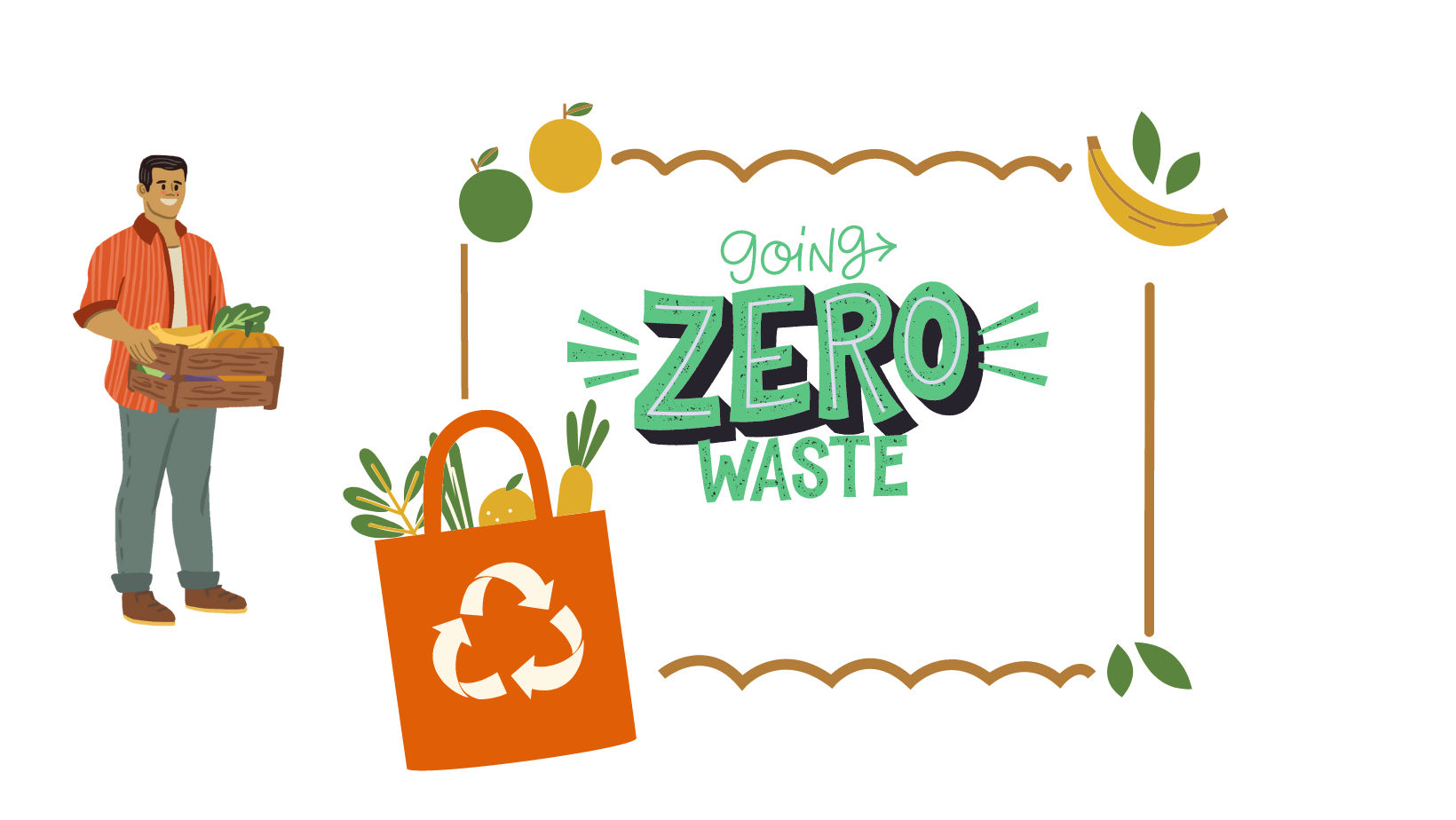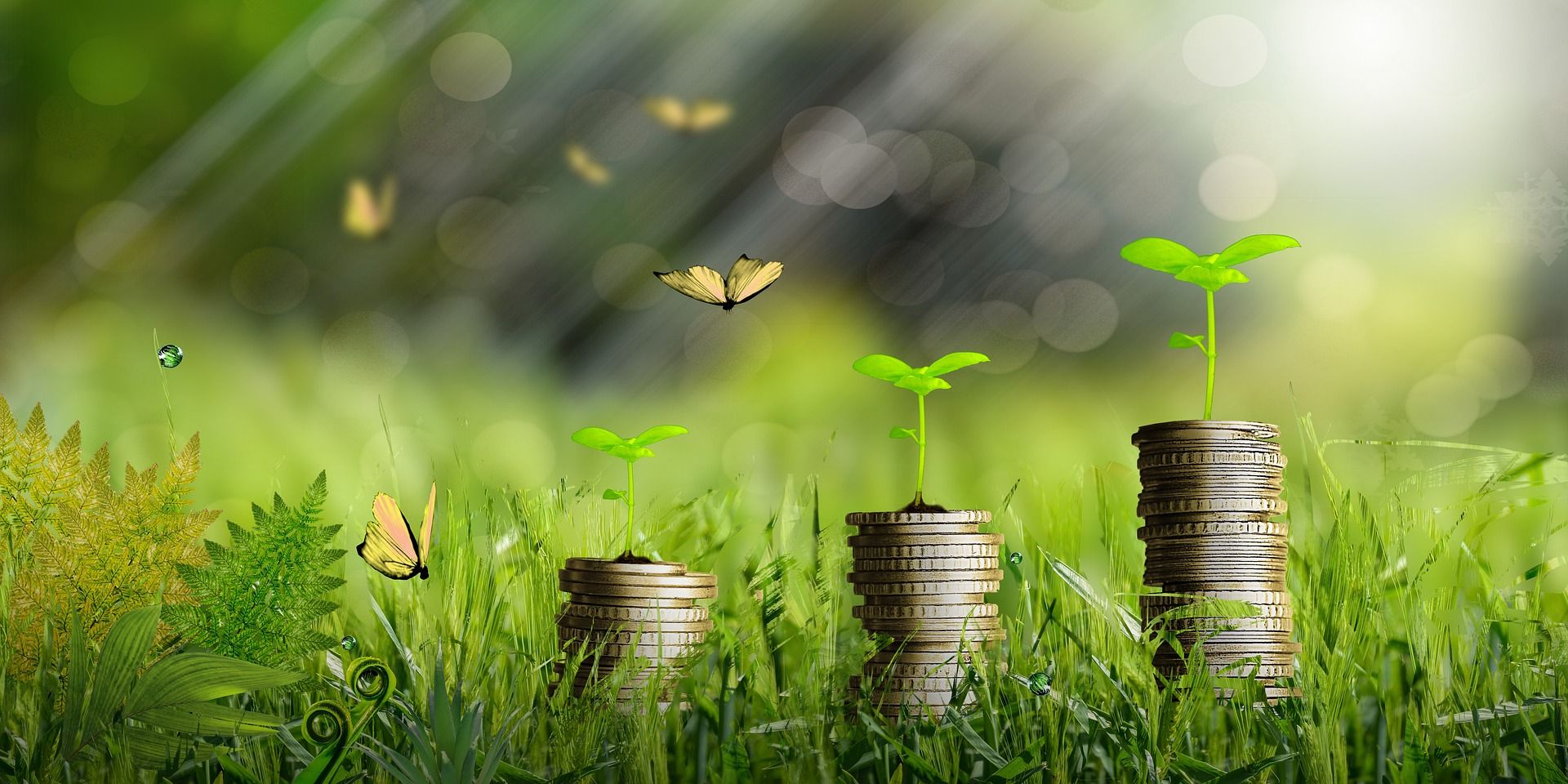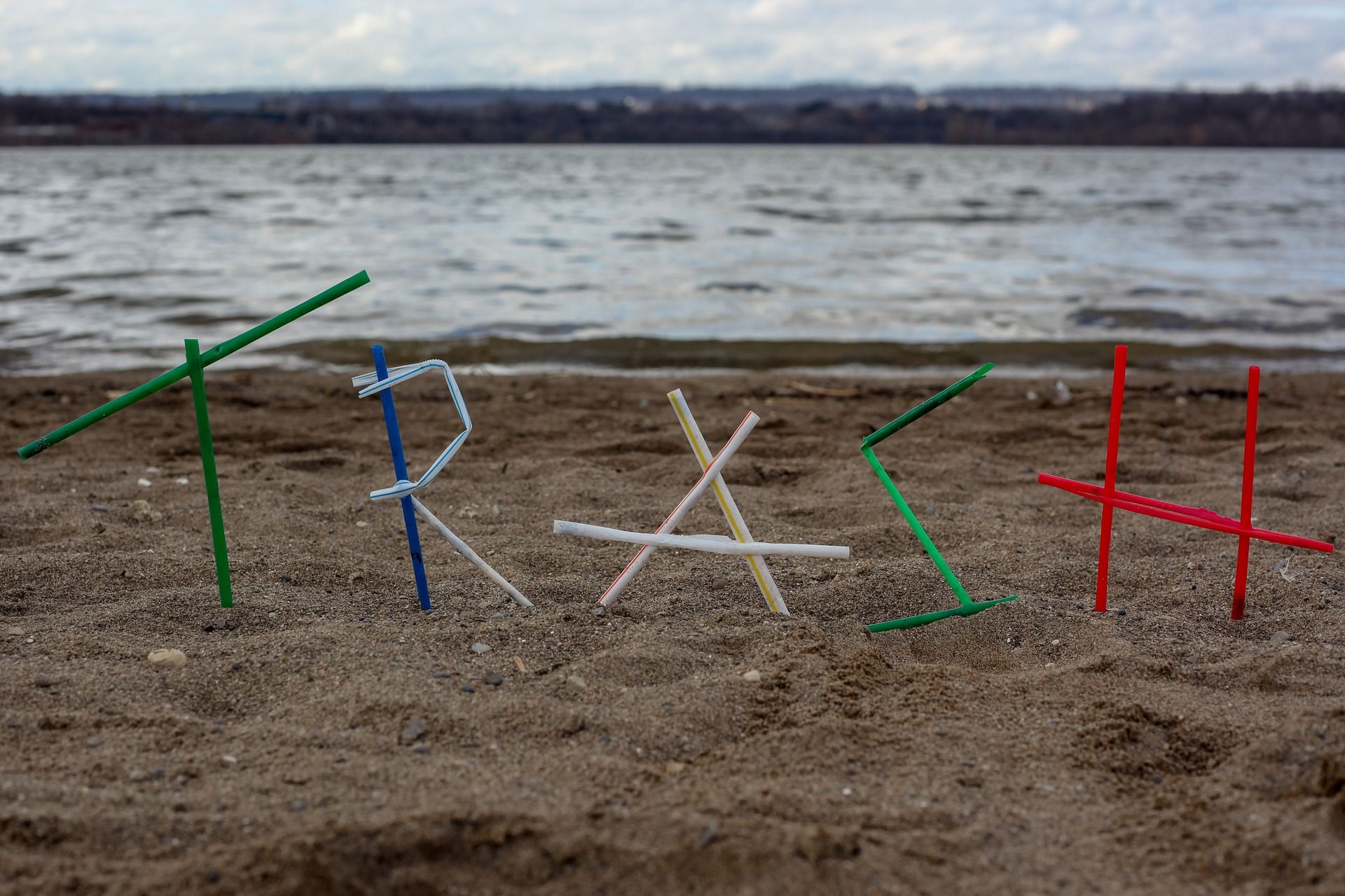We joined the plastic-free July challenge in July 2021, in Nairobi, Kenya. We aimed to see what a plastic-free lifestyle meant for a Nairobian, mostly shopping at the supermarket and shops within our estates. We documented instances when we could avoid single-use plastic and other plastics. We also included cases when ditching plastic was difficult. This was important because, despite our efforts to keep away from plastic, we don’t live in a plastic-free world.
Here is documentation of what we experienced, for 31 days.
Table of Contents
July 1, 2021: Bread and Petroleum Jelly
July 2, 2021: Instant Coffee and Salt
July 4, 2021: Spices, Cereals and Mineral Water
July 5, 2021: Soda and Flip Flops (Slippers)
July 6, 2021: Comb and Tissue Paper
July 7, 2021: Plastic Toothbrush
July 9, 2021: Loofah, Kitchen Sponge and Bread Spread
July 10, 2021: Plastic Cutlery and Plastic Takeaway Containers
July 12, 2021: Water Bottles, Coffee Cups, and Pasta
July 13, 2021: Diapers and Chewing Gum
July 14, 2021: Plastic Cotton Buds and Ready-To-Drink Juice
July 15, 2021: Cling Film and Plastic Pantry Containers
July 16, 2021: Nylon Grocery Bags and Packaging From Online Stores
July 17, 2021: Maize Meal, Wheat Flour, and Rice
July 18, 2021: Plastic Bottle Brush and Handwash
July 19, 2021: Balloons and Toothpaste
July 20, 2021: Plastic Foot Scrubber and Cheese
July 21, 2021: Milk in Plastic Bottles and Snacks
July 23, 2021: Bath Bar Soap and Hair Extensions
July 24, 2021: Eggs and Laundry Powder and Bar Soaps
July 25, 2021: Deodorant and New Clothes
July 26, 2021: Crisps and Garbage Bags
July 27, 2021: Hotel Room Items and Sugar
July 28, 2021: Yoghurt and Cooking Oil
July 29, 2021: Disposable Face Mask and Tea Leaves
July 30, 2021: Kitchen Sponge, Scouring Pad, and Pet Food
July 31, 2021: Deli Items, Prepackaged Fruits, and Precut Vegetables.
July 1, 2021: Bread and Petroleum Jelly

We could avoid bread in plastic packaging.
You can buy plastic-free bread in wax paper packaging in Kenyan supermarkets. Broadways Bread and United Millers are great examples.
Option 2: Buy bread from a local baker, who will package it in a cotton bread bag or brown paper bag.
Option 3: Bake your bread.
We couldn't avoid petroleum jelly in plastic packaging.
The plastic packaging for petroleum jelly is polypropylene (PP) number 5, and recyclable, which we send to a recycler after use.
Petroleum jelly is common in most Kenyan households, but it is not ecofriendly. It is made from a non-renewable resource, a byproduct of petroleum refining. Petroleum is a fossil fuel, thereby contributing to climate change.
Gladly, there are natural petroleum jelly alternatives. You can buy from local organic shops.
They include:
- Waxelene
- Unrefined coconut oil
- Shea butter
- Lanolin
- Olive oil
- Jojoba oil, etc.
There are also petroleum jelly alternatives that you can make at home. For example, mixing olive/almond oil with beeswax. You can also mix cocoa butter, jojoba oil, and beeswax.
Our metal jars are great for storing these natural skin products. You could also repurpose an empty petroleum jelly tin.
July 2, 2021: Instant Coffee and Salt

We could avoid instant coffee in plastic packaging.
We bought instant coffee in a glass jar or aluminum jar.
We repurpose our jars as storage for milk, hazardous items as steel nails, or as a vase.
We couldn't avoid salt in plastic packaging.
To avoid loss of iodine, the United Nations Food and Agriculture Organization (FAO), recommends packaging of iodized salt in airtight bags of either polypropylene (PP) plastic or high-density polyethylene (HDPE) plastic, laminated or non-laminated.
The eco option would be jute bags, but they must be lined with plastic. Grade 1803 DW jute bags lined with 150-gauge polyethylene (PE) sheet or LDPE-lined jute bags.
Remember to send your salt packaging to a recycler. You can also return it to the manufacturer for recycling.
July 3, 2021: Plastic straws

We could avoid single-use plastic straws.
Options include metal and bamboo straws. We sell them.
We couldn't avoid the single-use plastic straw attached to boxed drinks such as milk.
Metal juice straws fit perfectly in the straw slot.
Is it possible for manufacturers of this product to have a no-straw option?
July 4, 2021: Spices, Cereals and Mineral Water

We could avoid plastic packaging when buying spices and cereals.
We bought spices and cereals plastic-free.
There's a bulk section at supermarkets where you can buy spices, cereals, and nuts plastic-free, packaged in brown paper bags or your bag.
You can also buy them at your local open-air market.
We couldn’t avoid mineral water in plastic bottles.
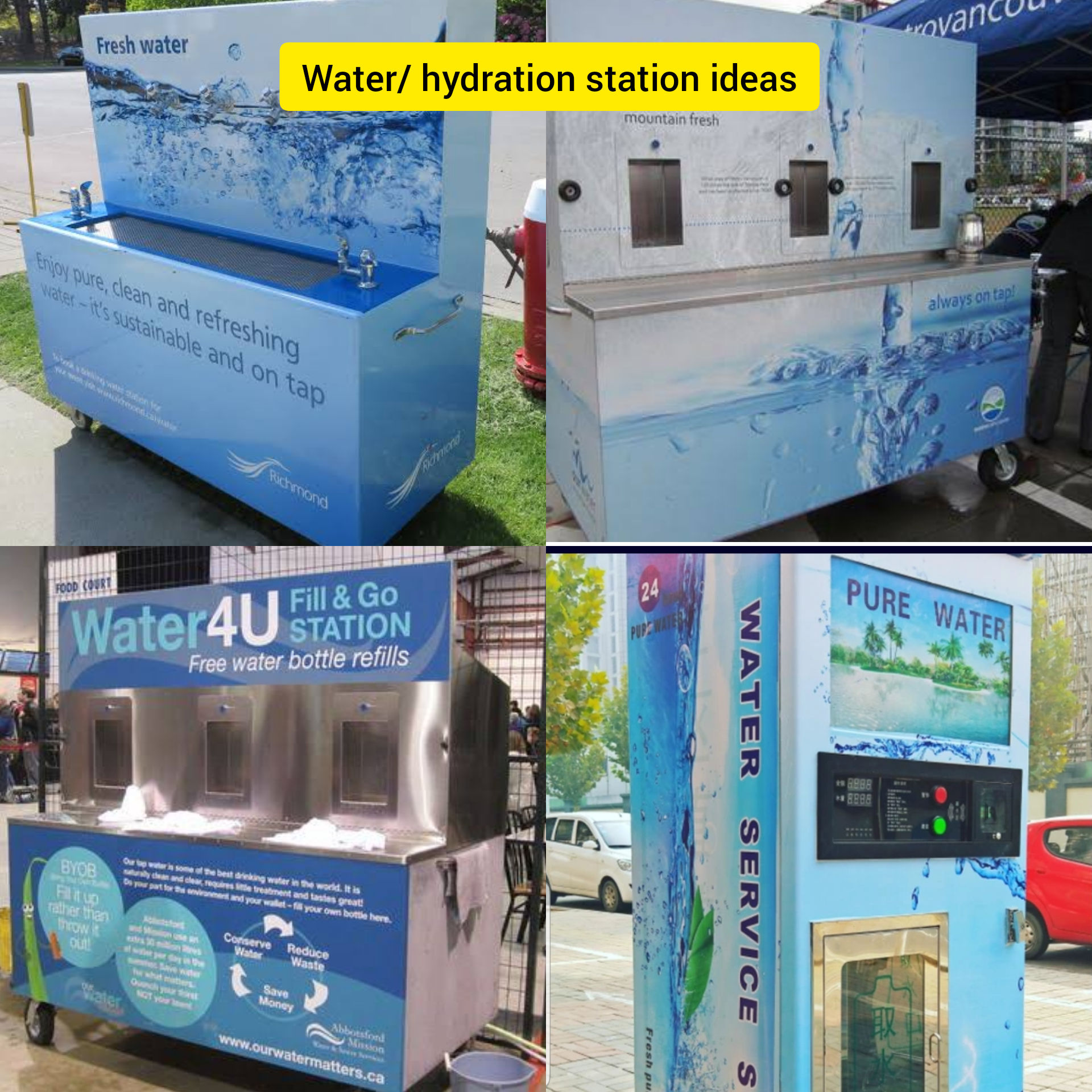
Even when we carry reusable bottles, we still fetch the water from a water dispenser, dispensing from a plastic bottle.
These light bottles are non-returnable, so end up discarded. They are Polyethylene terephthalate (PET) commonly recycled in Kenya.
Repurpose or reuse before sending to a recycler.
There's a refill option, however, and the bottle price is included in the total cost.
Refill stations are in some estates. Do you have one where you live?
When planning an event, please consider a water/hydration station, instead of distributing plastic bottles.
We don’t know of any events company offering this solution.
July 5, 2021: Soda and Flip Flops (Slippers)

We could avoid buying soda in plastic bottles.
We bought soda in glass bottles.
Ideally, these bottles should be in a wooden crate, like they were in the 80s. Now the wooden Coca-Cola crate is considered vintage. Rare to find. Do you have one?
We already have a plastic crate, which we've had for over 10 years. Replacing with a wooden crate is ideal, but not the eco-choice, at the moment. The sustainable thing is always to use what you have, but replace it with an eco option/alternative, when it is time for a replacement.
We couldn't avoid flip flops aka slippers.

Flip flops are found in almost all Kenyan homes.
They are made of synthetic rubber, a plastic polymer, which is also a huge contributor to climate change.
When synthetic rubber is vulcanized, soot, a carbon particle, is released into the environment. This is the same material that makes our car tyres.
In Kenya, Oceansole recycles flip-flops, and local artisans make flip flops (akala) from worn-out tyres.
You could also buy flip flops made from leather, a by-product of the meat industry.
Do you know of any sustainable vegan-friendly flip-flop brands in Kenya?
July 6, 2021: Comb and Tissue Paper

We could avoid a plastic comb.
We used a bamboo comb to replace a plastic comb.
We couldn’t avoid tissue in plastic packaging.
We found tissue paper made from recycled paper (blended tissue paper) at the supermarket, but multi-packs, usually bought by families, are wrapped in plastic packaging.
The tissue papers are unwrapped. However, in a pack of 2-10, they are wrapped in plastic packaging.
There is also a wrapped option for multi-packs, but still in plastic packaging.
You can, however, find singular tissue paper wrapped in paper, in smaller shops, and sometimes in major supermarkets.
July 7, 2021: Plastic Toothbrush

We could avoid a plastic toothbrush.
We used a bamboo toothbrush in place of a plastic toothbrush.
We couldn't avoid nylon bristles in a bamboo toothbrush.
The bristles of bamboo toothbrushes are made of plastic. Even charcoal-infused (black bristles) or castor-oil bristles (white bristles) are mixed with nylon bristles, commonly at a ratio of 3:2. The DuPont nylon bristles are necessary.
For disposal, snap the bamboo toothbrush head using a pair of pliers. Break the head to ease plucking of the bristles. Compost the bamboo handle and bristle-free head.
The bamboo handle can also be used as a marker for your potted plants, a substrate for climbing plants, or you can throw it in a bonfire when camping.
These bristles can go in your plastic recycling. Because they are so small, and can easily get lost, we suggest that you put them inside another plastic item. Send that item to a recycler once you fill it with more toothbrush bristles.
July 8, 2021: Icecream

We could avoid ice cream in plastic packaging
We opted for ice cream in a cone or homemade ice cream.
We also learned about the history of the ice cream cone.
Italo Marchiony made the first ice cream cone in 1896 and was granted a patent in December 1903. It is, however, an independent happening at the 1904 St. Louis World Fair that is responsible for the ice cream cone's popularity.
Ernest Hamwi, a Syrian concessionaire, was selling waffle-like pastry near an ice cream vendor's booth. The ice cream became very popular, and the vendor ran out of dishes. Hamwi quickly rolled out his waffle-like pastry into a cone, and customers loved the idea!
We couldn’t avoid plastic packaging for family-size ice cream
Unfortunately, family-size ice creams are all packaged in plastic containers.
Repurpose the plastic container for food storage etc., and when it's time to dispose of it, put it in the appropriate recycling bin.
There’s hope:
Businesses are working on a plastic-free alternative.
There are paper ice cream tubs, but they are lined with polyethylene (PE) plastic. We still commend these efforts because these are conversation starters, and proof of continuing research and development into greening our planet.
In the UK, ice cream brand, Northern Bloc, has rolled out ice cream in paperboard cups, lined with biodegradable polybutylene succinate (BioPBS), a plant-based material, that decomposes into water and carbon dioxide when composted.
According to Northern Bloc, the packaging is 100% biodegradable, compostable, and paper recyclable, and commercial composting facilities aren't required.
July 9, 2021: Loofah, Kitchen Sponge and Bread Spread

We could avoid nylon loofah and kitchen sponges
Natural loofah is a good replacement for nylon loofah and kitchen sponges.
Great for scrubbing your body in the bathroom, cleaning walls, sinks, and surfaces, and doing dishes.
We couldn’t avoid plastic packaging in bread spread.
Margarine is packaged in polypropylene (PP) plastic containers. These can be repurposed, then sent to a recycler.
Margarine was packaged in aluminum tins in the 80s. Should we go back to the original margarine aluminum tin?
You can avoid plastic by buying butter, a more expensive option. It is packaged in wax paper.
Some brands sell jam in glass jars or aluminum jars, and you could also use homemade jam.
Honey and avocado combo is good too, made at home. Several organic shops sell authentic honey in glass jars.
July 10, 2021: Plastic Cutlery and Plastic Takeaway Containers
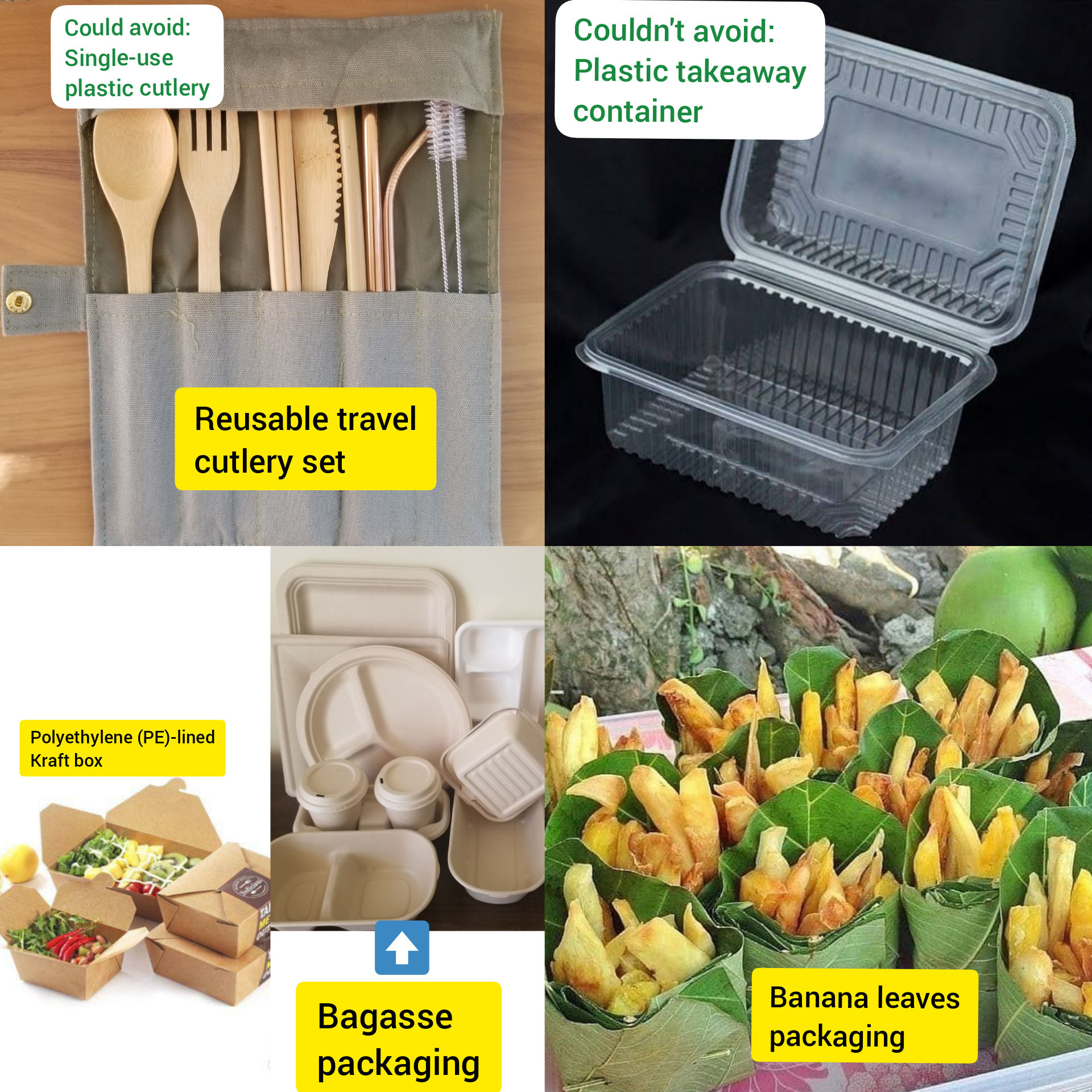
We could avoid single-use cutlery.
We switched to a reusable cutlery set.
A reusable cutlery set eliminates the need for single-use plastic cutlery. Please remember to always carry your set.
We couldn't avoid plastic restaurant takeaway containers, and cutlery, in some instances.
Sometimes, even after requesting for zero cutlery and condiments, we still receive them. We, however, don't tire.
Not all restaurants use polyethylene (PE)-lined Kraft paper packaging or bagasse for their deliveries. This makes it difficult to avoid plastic takeout packaging.
It is ironic for plastic cutlery to be delivered at home because we already have cutlery in our homes. Kenyans order approximately between 6,000 and 10,000 servings of food daily. If we assumed that half of these servings (3000) are delivered in homes, daily, with a single-use spoon, fork, and knife, then we would be discarding about 3.2 million single-use plastics annually, on a minimum.
So, the next time you're ordering in, please request for a NO cutlery option.
Hospitality industry, can we make to-go cutlery on request only, a thing? Even when it's ecofriendly cutlery?
Countries like Vietnam are using banana leaves for takeout. Would you accept take-out in banana leaves?
In Kenya, the Nairobi City County seeks to ban these plastic containers, through the Nairobi City County Plastic Control (Amendment) Bill, 2021. Alternatives including bagasse takeaway containers and Kraft paper boxes exist.
July 11, 2021: Condiments
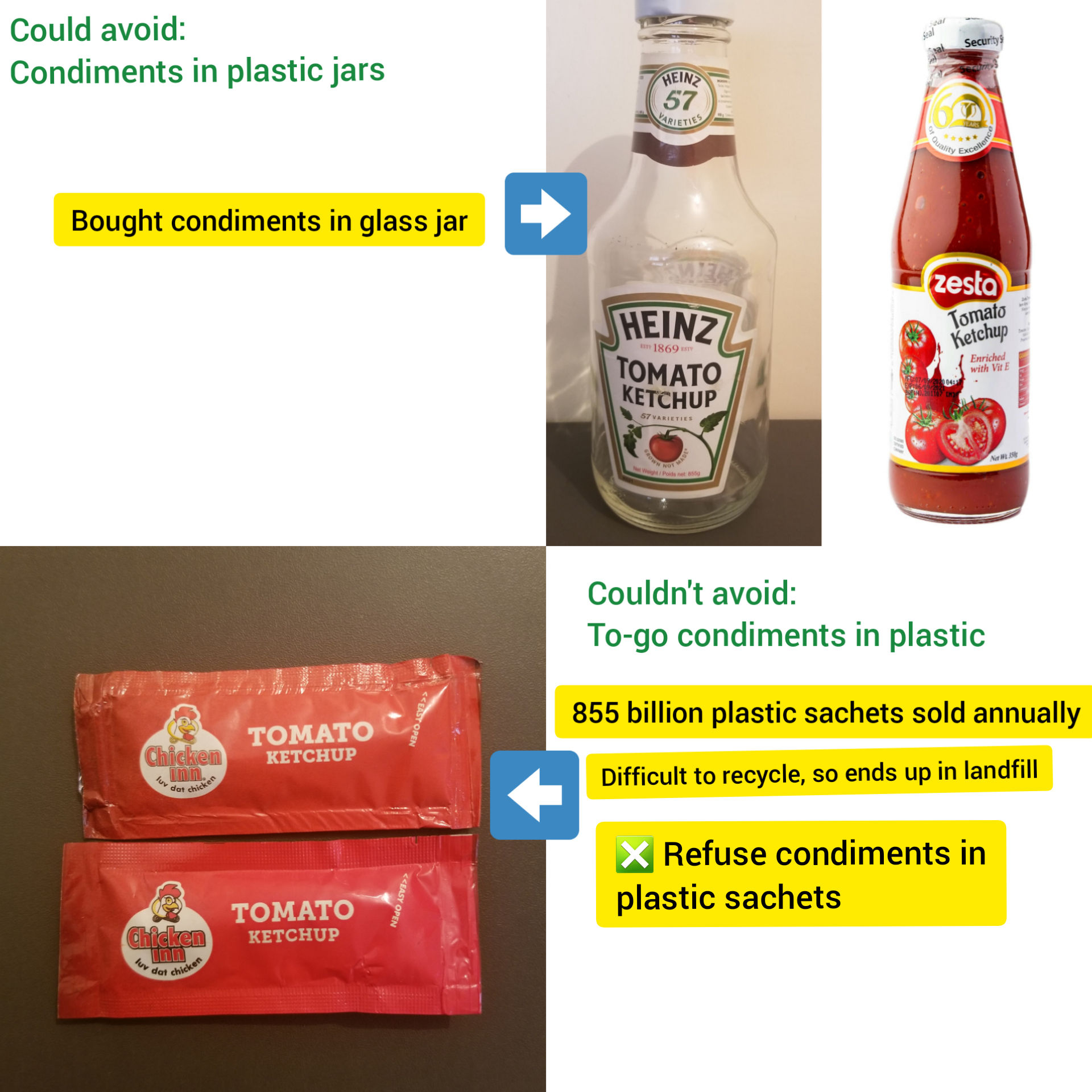
We could avoid condiments in plastic packaging.
Condiments are substances that we use to flavor our food. They include ketchup, mustard, chili sauce, tomato sauce, and mayonnaise.
Homemade condiments are a great plastic-free option.
If you'd rather buy, consider ketchup from Zesta from Tru Foods, Heinz tomato ketchup, and Smokeless Kitchen.
Green Spoon Kenya has a wide variety of condiments, including, basil pesto, peri-peri sauce, and whiskey mustard. All sold plastic-free.
We couldn't avoid to-go condiments in plastic.
Takeout/ to-go packages in Kenya always include small sachets of condiments.
There's increasing global talk to ban sachets.
Why?
According to Sack the Sachet, 855 billion plastic sachets are sold annually, globally. These sachets contain samples for shampoos, lotions, shower gel, and condiments! Because they're multi-laminate, made of both plastic and foil, they are difficult to recycle, and end up in our landfills!!
As a result, plastic sachets are the most commonly found litter, in large quantities than plastic bottles and cigarette butts!!
What can you do?
- Refuse condiments in sachets.
- Carry your condiments when traveling.
- Pour the condiments on the side of your takeaway container. Compartmentalized takeaway containers would suffice.
- Join the campaign #sackthesachet.
Should Kenya include plastic sachets in the single-use plastic ban? We think that we should, as soon as we have alternatives. We cannot ignore sachets because the ‘kadogo’ economy in Kenya is responsible for a bulk of transactions in the retail industry, making them necessary. We need ecofriendly solutions.
July 12, 2021: Water Bottles, Coffee Cups, and Pasta

We could avoid plastic water bottles and plastic coffee cups.
We carry a reusable tumbler, bottle, or flask when we step out. They are plastic-free. Made of glass or stainless steel.
We prefer vacuumed bottles and tumblers to keep our cold drinks cold and hot drinks hot.
In the event, you forget your reusable tumbler for coffee, and a reusable alternative isn’t available, consider only ecofriendly single-use coffee cups.
We couldn't avoid pasta in plastic packaging.
Most of the brands commonly found in Kenyan homes use plastic packaging.
It was difficult, in some instances, to figure out the type of plastic used. There was no labeling, whatsoever.
Fortunately, one brand labeled the plastic packaging as polypropylene (PP), which is recycled in Kenya.
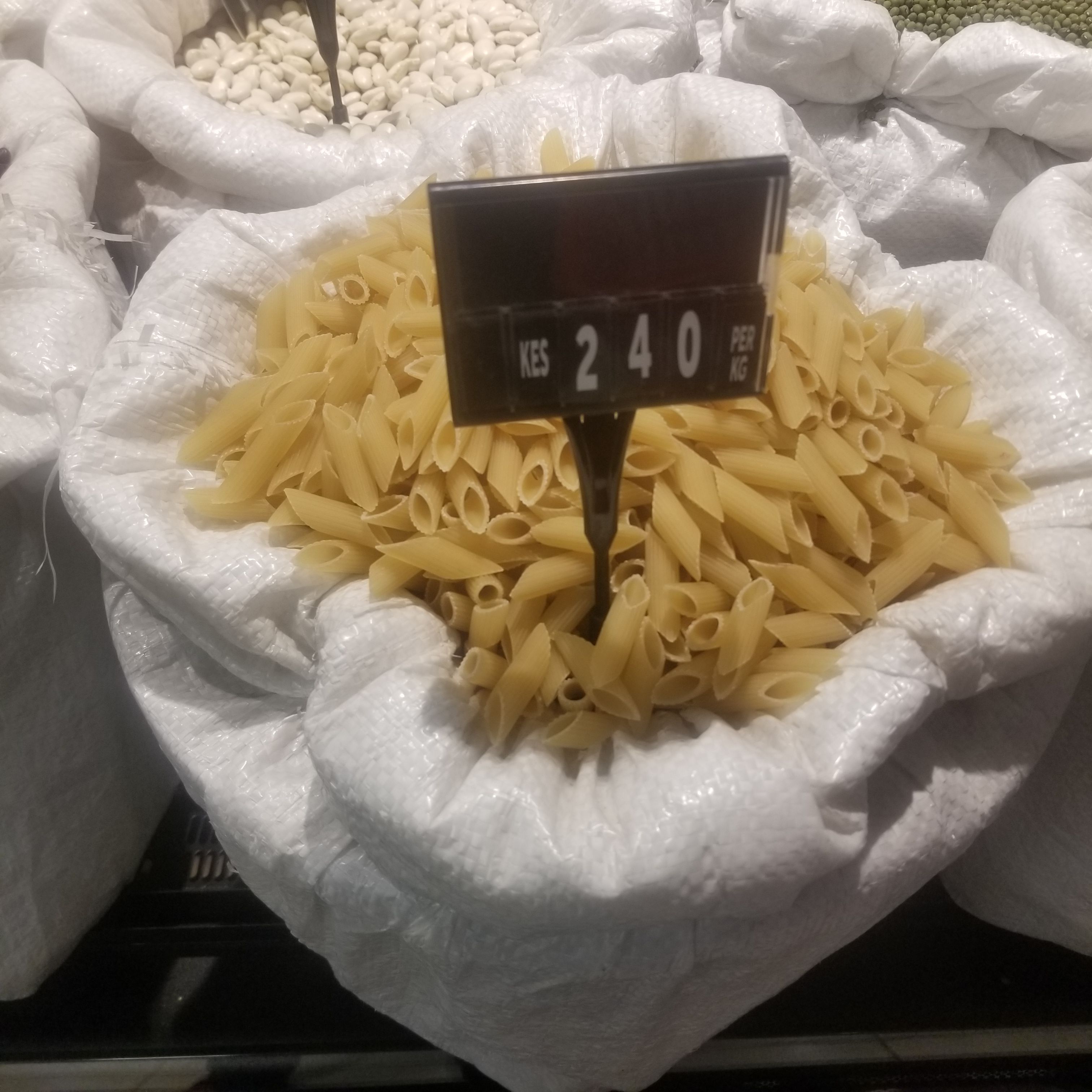
The Barilla brand, found in most supermarkets, sells pasta in 100% recyclable cardboard boxes. The boxes previously had a plastic window, but the company removed it, mid 2020.
You can also find plastic-free macaroni at the bulk section at Naivas and Carrefour supermarkets.
Two other global brands that have developed plastic-free pasta packaging include:
- Cerealto Siro, which packages pasta in 100% paper-based pulp
- UK brand Napolina packages pasta in 100% recyclable cardboard
Did you know that you can also make pasta at home? Try this recipe by the zero waste chef.
July 13, 2021: Diapers and Chewing Gum
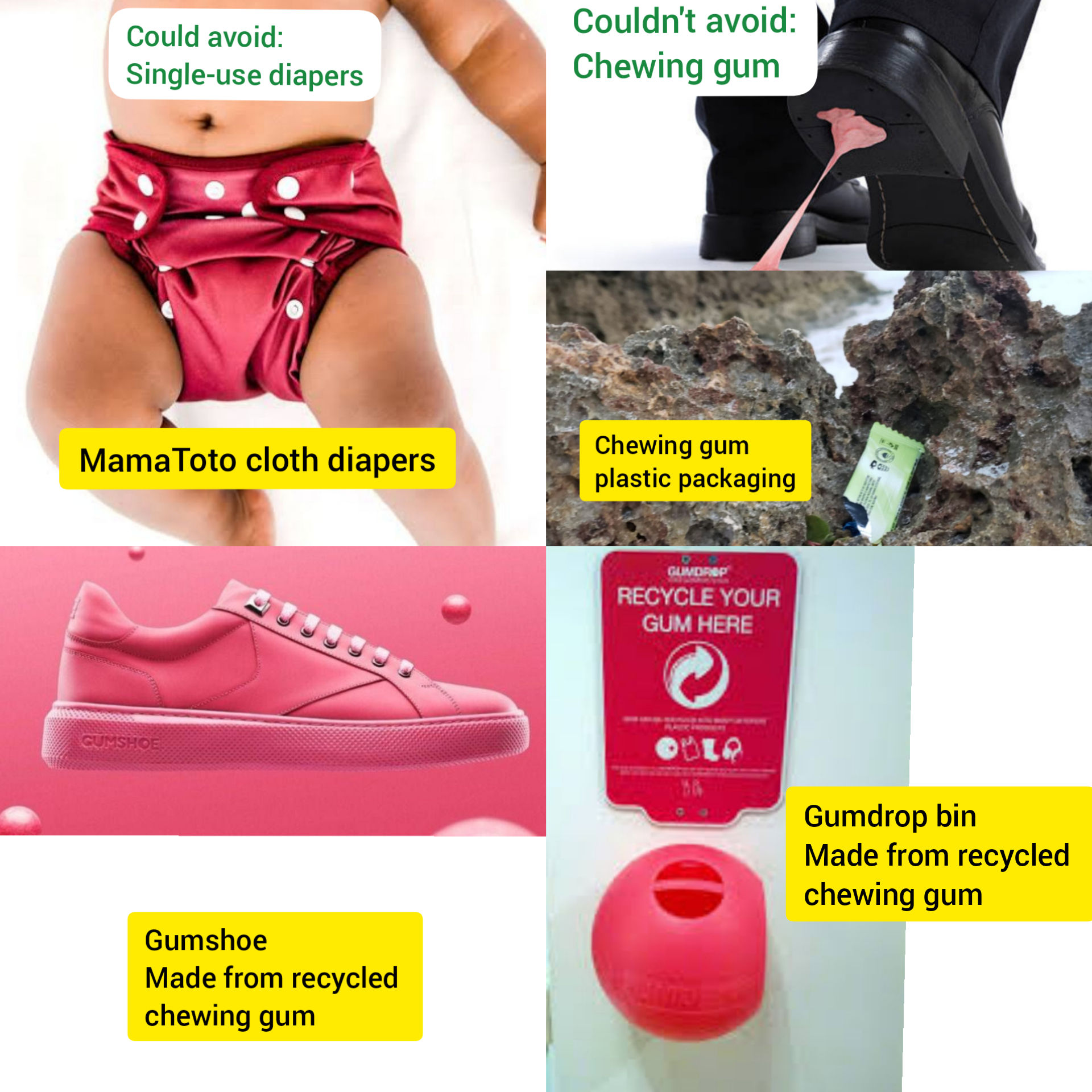
We could avoid single-use diapers
Replace single-use diapers, with reusable cloth diapers.
Single-use diapers are used for a short while, but last 500 years in the landfill. Alternatively, you can use reusable cloth diapers, such as napkins, or consider MamaToto Cloth Diapers.
MamaToto Cloth Diapers Enterprise is a social enterprise that offers ecofriendly and reusable cloth diapers, designed for the Kenyan market.
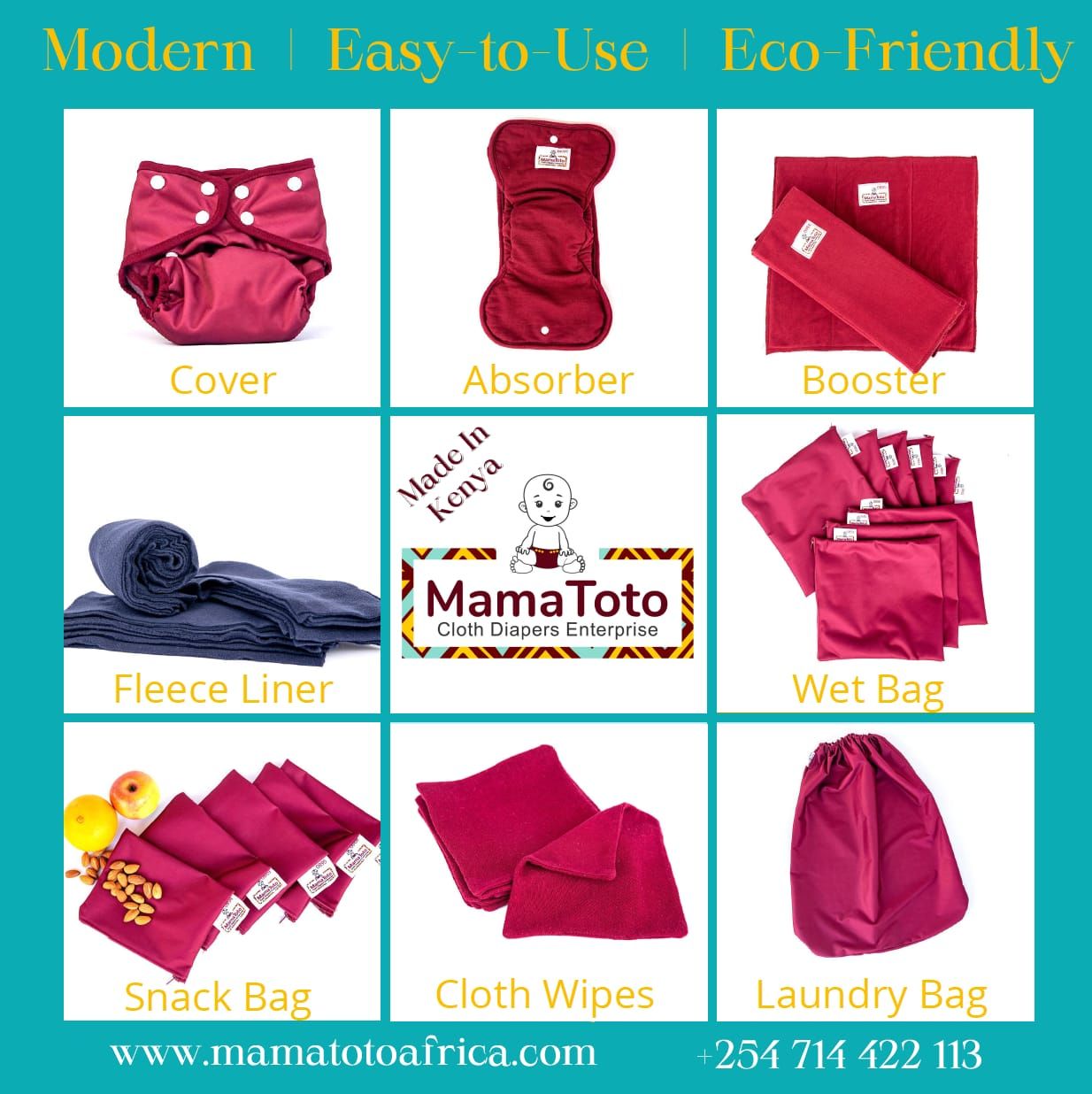
Why MamaToto cloth diapers?
- Reduce pressure on our landfills. MamaToto projects that they will save Nairobi from 48,000,000 disposable diapers by year 3 of their operations.
- Cost-effective- Can save you up to Ksh. 150,000 in single-use diaper purchases. Last 3-5 years, diapering 2-3 children minimum.
- Support local tailors, drivers, and everyone in this value chain.
- The diapers are a better design than napkins. Fewer leaks and no more incidences of pins poking babies.
- For lower-income households that cannot afford the upfront cost of a cloth diaper, MamaToto offers a rented diaper service, laundering and sanitizing them at the Nairobi Hospital. It is safe for the baby.
- MamaToto covers are also compatible with the commonly used white cotton napkins.
We couldn't avoid chewing gum, and sometimes, chewing gum in plastic packaging.
Did you know that plastic is a basic ingredient for chewing gum?
Before this discovery, chewing gum in paper packaging was our way of avoiding plastic. Little did we know that we skipped plastic packaging, only to ingest plastic!
How?
Gum base, an ingredient in most chewing gum, is polyvinyl acetate (PVAc), a plastic polymer, which gives gum its chewiness property.
Consequently, chewing gum takes between 5-1000 years to decompose!!
The plastic property makes it easy to recycle chewing gum to make soles for shoes (Gumshoe) and bins (Gumdrop bins). 1kg of gum makes soles for four pairs of shoes.
Gladly, there are natural alternatives to breath-freshening chewing gum.
These include, but are not limited to:
- Mint leaves
- Cardamom pods
- Cloves
- Mints in plastic-free packaging.
If you still decide to chew gum, remember plastic chewing gum wrappers aren't recycled and litter our environment, choking marine life. Choose chewing gum wrapped in paper.
July 14, 2021: Plastic Cotton Buds and Ready-To-Drink Juice

We could avoid plastic qtips, by using bamboo qtips.
A seahorse was observed using a plastic qtip to ride the ocean currents. This shouldn't happen. Consider replacing your plastic qtips with bamboo qtips, and only buy the ecofriendly cotton buds, after you’ve used up the plastic ones you have. That’s the most sustainable thing to do.
We couldn't avoid juice in plastic bottles.
Juice is a common refreshment served to guests in Kenyan homes. A Ksh. 250 bottle of undiluted juice can easily serve a family for a month.
If you can afford it, please consider making fresh fruit juices.
Ready-to-drink juices are sold in polyethylene (PE)-lined carton boxes. The juice boxes have 6 layers made of paper, PE plastic, and aluminum. This combination takes about 40 years to degrade in the environment.
In 2019, Kevian Kenya, the company behind the Pick N’ Peel and Afia brands set up a recycling plant, Ramani Recyclers, in Thika. They signed a collection partnership deal with Tetra Pak, Kenya Airways, and Brookside Dairy, among others.
They also work with Taka Taka Solutions and December Waste. Drop your PET bottles and juice cartons at the appropriate bins, and they'll get to Thika for recycling.
Ramani converts this waste to lami boards, alternatives to MDF and marine boards.
Do you remember the Treetop juice glass bottles in the '80s? Can we revert to packaging juice in glass bottles, and have a returnable system?
July 15, 2021: Cling Film and Plastic Pantry Containers

We could avoid single-use cling film
We use reusable bowl covers to replace single-use plastic cling film.
We couldn't avoid plastic containers in the pantry.
Ideally, the pantry should have glass containers, but, some of us still have plastic containers.
Very neat images of glass pantry containers are, indeed, goals, but only replace WHEN it is time to replace your plastics.
Our containers are about 11 years old. We'll replace them with glass when it's time. That's the eco thing to do.
Also, allow us to address the current trend of buying glass spice jars, only to buy spices in plastic jars, to pour them into the glass containers and discard the plastic.
That's not an ecofriendly or sustainable choice.
Buy the spices plastic-free at the bulk market or bulk section in the supermarket, then store them in your glass containers.
You could also keep plastic containers from your previous purchase, and refill them after purchasing spices from the bulk store
July 16, 2021: Nylon Grocery Bags and Packaging From Online Stores

We could avoid single-use nylon grocery bags.
Ditch the single-use nylon bag, replacing it with a reusable cotton grocery bag.
There's a challenge, however. Whenever groceries such as onions are delivered at home, they come in nylon bags!
You can always instruct your supplier to deliver the groceries naked to your home, stacked in a box in a manner that delicates like tomatoes won't be squished.
Carton is easily recycled in Kenya. Reuse or repurpose the box. If not, send it to a recycler.
We couldn't avoid plastic from online stores.
Jumia Kenya packages are a good example.
When a client raised concern on Twitter, Jumia Kenya responded by asking clients to have an alternative NEMA-approved bag to carry their order, then hand over the plastic bag to the delivery associate. Alternatively, one can leave the plastic bag at Jumia drop-offs.
Jumia has made some changes. Depending on your package, you’ll sometimes receive items in carton boxes.
On a different note, what do you feel about carbon emissions as a result of same-day deliveries? A weekly trip carrying bulk is more efficient than 7 trips in a week, carrying very small orders.
Would you accept a 7-day wait period to allow businesses to collate orders and send them in bulk? In a world where customers are increasingly focused on efficiency, would this work?
July 17, 2021: Maize Meal, Wheat Flour, and Rice

We could buy maize meal and wheat flour plastic-free.
Wheat and maize meal are some of the easiest commodities to find plastic-free in Kenyan supermarkets.
Other sources are the posho mill and bulk cereals shops.
Even a bale of unga is packaged in paper bags, although some brands package bales in plastic.
We couldn’t avoid rice in plastic-packaging at the supermarket, for preferred brands or specific types of rice
Yes, you can easily find plastic-free free rice in Kenya.
Cereal shops and the market are great sources of plastic-free rice.
Even then, allow us to address the issue in our supermarkets. Variety of different qualities of rice, all sold in plastic packaging.
We couldn't figure out how to recycle the plastic, because most brands didn't label the type of plastic used in their packaging.
Globally, some brands package rice in boxes.
To ease pressure on paper, brands could consider 100% jute rice bags.
July 18, 2021: Plastic Bottle Brush and Handwash
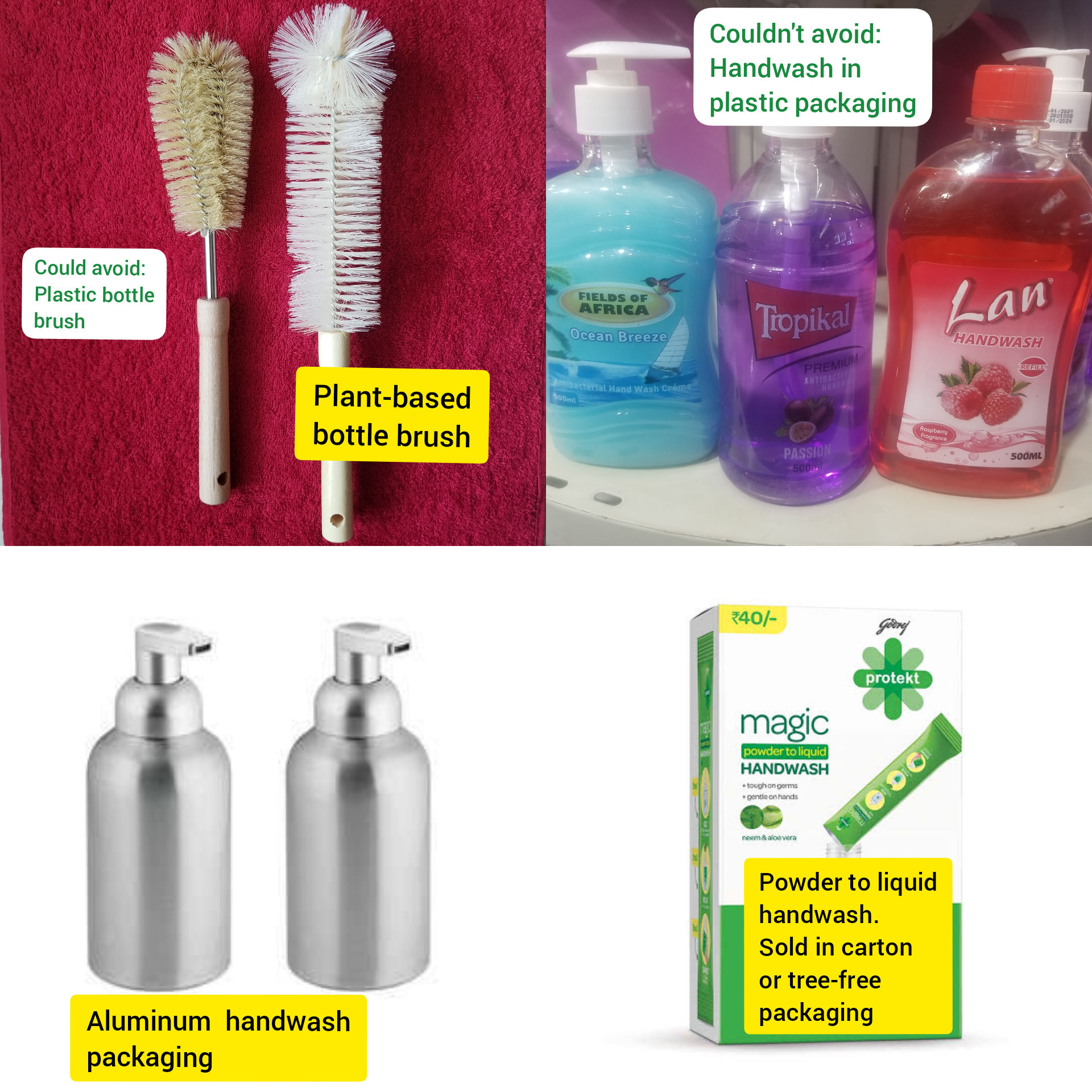
We could avoid plastic bottle brushes
Plant-based bottle brushes replace plastic bottle brushes.
Our bottle brushes are 100% plant-based, with bamboo handle and sisal bristles.
We couldn't avoid hand wash in plastic containers.
For communal use, liquid soaps are considered to be more sanitary than bar soaps.
All handwash brands at the supermarket used plastic packaging.
There are alternatives like aluminum bottles.
Powder to hand wash liquid is a thing! If you're in the toxin-free soap business, please consider this game-changer. The powder is sold in tree-free paper packaging, which consumers can mix in their homes to make hand wash. Selling concentrates is also feasible, but packaged in plastic-free bottles, or sold on tap.
July 19, 2021: Balloons and Toothpaste

We could avoid balloons.
Balloons cause environmental havoc, traveling miles away, littering the environment, and choking animals.
Balloons are, in fact, part of the single-use plastics banned in Kenya's protected areas.
Consider crepe paper, wooden decorations, paper balloons, and leaves for decorations.
We couldn't avoid toothpaste.
Toothtabs, toothpowders, and homemade toothpaste are plastic-free alternatives to toothpaste.
Mix baking soda, salt, and water to make homemade toothpaste. You can find other formulas online.
For those who still prefer to buy toothpaste, Colgate has switched to a recyclable tube and recyclable carton for the packaging, for some of its products with 97% natural ingredients, according to them.
Recycle the tube and cap with high-density polyethylene (HDPE), plastic number 2.
Not all paper packaging can be recycled. The Colgate carton paper is recyclable, marked as 21 PAP, which is both recyclable and biodegradable.
Why is this news?
Until recently, toothpaste tubes have been unrecyclable, ending up in our landfills. About 20 billion toothpaste tubes contribute to the plastic crisis, annually.
Reportedly, toothpaste contains toxic ingredients such as Sodium Lauryl Sulfate (SLS), and excess fluoride can lead to fluorosis.
Should you still choose to use toothpaste, please consider those packaged in recyclable tubes and packaging.
July 20, 2021: Plastic Foot Scrubber and Cheese

We could avoid a plastic foot scrubber
Natural pumice stone replaces the plastic foot scrubber.
We couldn't avoid cheese in plastic packaging.
All brands at the supermarket packaged their cheese in plastic. Plastic is somewhat necessary because it prevents quick spoilage.
One brand packaged mozzarella in a paper box, but the cheese inside was still wrapped in plastic.
Our supermarkets could consider having cheese at the deli section. Mozzarella and feta cheese can be sold in brine, while ricotta and cream cheese can be sold by weight, without packaging. To prevent food waste, supermarkets will now need to store exactly what they need, due to reduced shelf life.
We haven't found any laws in Kenya that prevent this. Are there?
The cheese can be packaged in reusable containers that customers provide, returnable containers, or wax paper.
You could also buy cheese directly from a cheese store.
Homemade cheese is also an option.
July 21, 2021: Milk in Plastic Bottles and Snacks

We could avoid milk in plastic bottles.
How?
- Buying milk from the supermarket's milk ATM. You'll also find milk ATMs in estates. Bring your bottle, because supermarkets usually package in plastic bottles. There have been reports of unscrupulous business practices that negatively impact the quality of milk. Be careful.
- Milk in carton could be an option, but the package is multilayered with polyethylene (PE) plastic, aluminum, and carton. Like the juice option, this is the only other way you can buy milk already packaged branded milk, from our supermarkets.
- Buying from a local farmer
- Making plant-based milk at home. You can even have plant-based masala tea!
We couldn’t avoid snacks packaged in plastic, at the supermarket.
Plastic-free snacks can be difficult, especially when traveling with kids.
Some snacks packaged in paper boxes are then wrapped in a plastic outer layer.
Plastic is somewhat necessary for some of these snacks, to prevent sogginess. The industry is, however, looking for cost-effective alternatives that will still maintain the quality of their products.
There are biscuits options sold in carton boxes with zero plastic.
If you can, make homemade snacks.
July 22, 2021: Meat and Gifts

We could avoid meat packaged in plastic.
How?
- Buying at the butchery. They usually wrap meat products, including chicken, in paper or foil.
But, there's a problem. Sometimes, meat or nyama choma comes in foil paper, which is difficult to recycle. There's consensus that this type of paper is neither recyclable nor compostable, ending up in landfills.
- Supermarkets package meat in plastic, and not all accept containers from customers, citing health and safety standards.
Maybe if they are packaged in parchment paper, pass on to you, then you can put the meat into your reusable container, for a mess-free journey home.
In the Netherlands, various retailers are using biobased compostable packaging made of polylactic acid (PLA) derived from sugarcane. Bio4Pack reports that the dish, foil, label, ink on the label, and the absorption pad meet the EN13432 compostability certification standard.
PLA packaging usually requires industrial composting, but some can reportedly be home composted. To be on the safe side, you'd rather send to an industrial composter.
- We buy chicken directly from farmers, providing our packaging when picking it up.
We couldn't avoid plastic courtesy of appreciation tokens.
It's Kenyan culture not to visit someone empty-handed, making this one of the easy ways plastic comes into our homes.
How should we communicate this to our friends, without seeming rude?
We've learned how to check the type of plastics we interact with, so, we at least know how to responsibly dispose of them.
We can also politely teach our friends the benefits of going plastic-free and adopting a green lifestyle.
July 23, 2021: Bath Bar Soap and Hair Extensions

We could avoid bath bar soap in plastic packaging.
Buying bath bar soap from organic/toxin-free shops in Kenya is the easiest way to avoid plastic. Granted, a brand selling toxin-free products has the planet's and people's interests at heart, and so their packaging always considers that.
If you're buying the usual bar soaps we get from the supermarket, you’ll encounter 3 main types.
- Sold in a paper box but the bar soap inside is wrapped in plastic.
- Bar soap wrapped in plastic.
- Bar soap in a paper box. Choose this one.
We couldn't avoid plastic in our hair extensions.
Africa's and Kenya's dry hair industry including extensions, weaves, and wigs, is estimated to be worth Ksh. 62 trillion and Ksh. 25 billion annually, respectively. Unfortunately, synthetic versions of extension weaves and wigs contribute to the plastic crisis.
The manufacturing process uses chemicals and materials such as kanekalon (a combination of acrylonitrile and vinyl chloride), and PET plastic, releasing toxic fumes to the environment.
This market is driven by the need for protective hairstyles for those who don't like short hair or natural dreadlocks.
In Kenya, a group of women is turning this waste into a fortune, cleaning the hair, and reselling.
Internationally, we've seen three other initiatives to help alleviate the problem.
- Terracycle US rolled out a zero-waste box, allowing consumers to dispose of their hair extensions, wigs, and weaves, for recycling. Unfortunately, only human hair is accepted.
- Radswan planned to collect synthetic hair from their customers for recycling, from June 2021. We're not sure if they rolled out yet.
Is it possible for Darling Kenya and Angels Hair to replicate this? We'd love recycling bins available. You'll notice that salons, especially in estates, resort to open-air burning, if not sending to the landfill.
- The Bahamas Plastic Movement kicked off Plastic-free July by exploring zero-waste hair options, including extensions made from extracted fibers from local banana trees. Would you try it?
Human hair would seem like an option but the industry is marred by unethical practices. There's also an issue of waste generation and disposal.
Do you have an idea about green hair extensions solutions? This is the time to launch!
July 24, 2021: Eggs and Laundry Powder and Bar Soaps
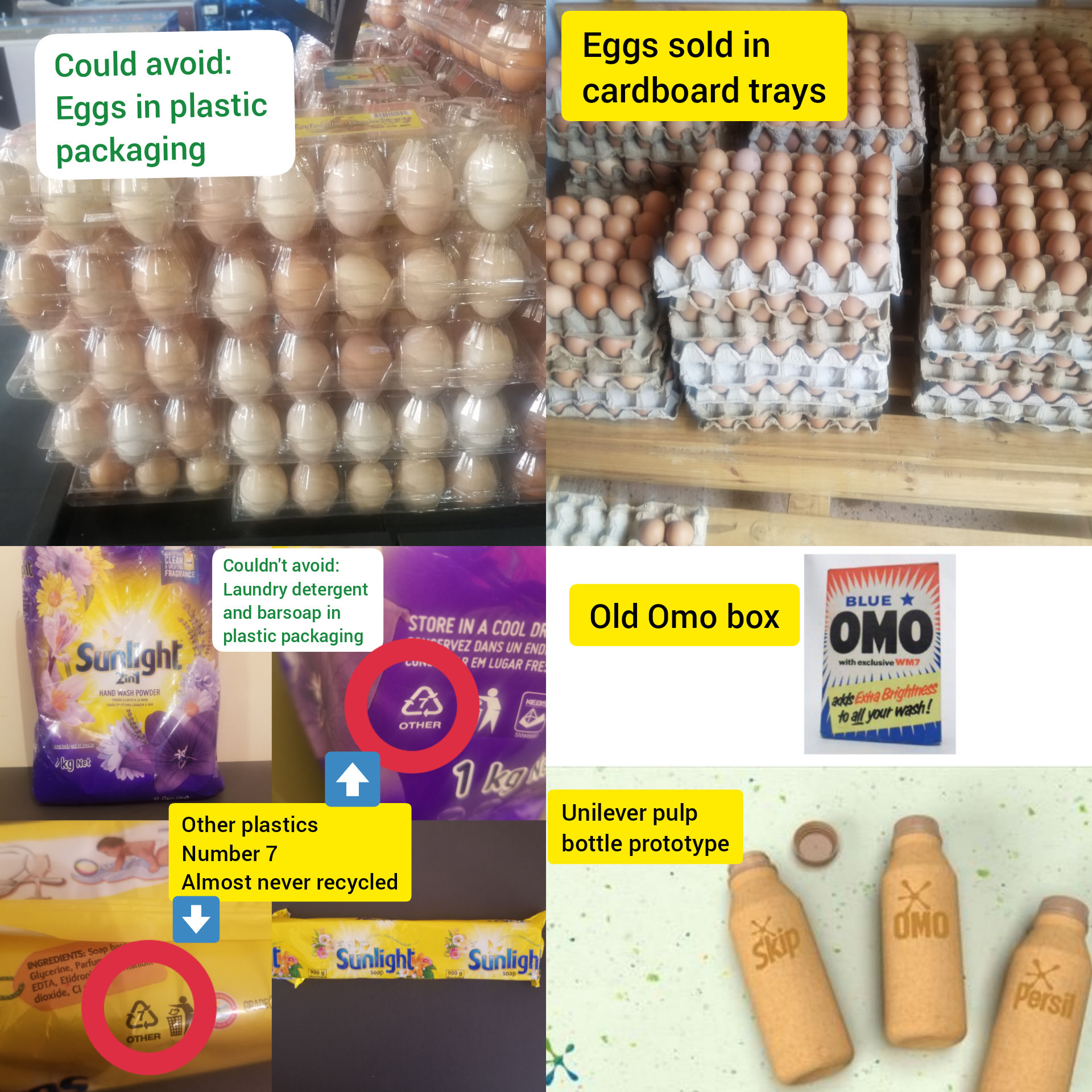
We could avoid eggs in plastic packaging.
Eggs are sold in our supermarkets in plastic packaging.
Buy eggs from local shops or directly from farmers, who sell eggs in cardboard trays. Supermarkets should also consider this.
We should also consider egg storage in our homes.
A cardboard egg tray is ideal. Some people prefer plastic at home because unlike cardboard, it may not harbor bugs, is very easy to clean, and is waterproof.
If you use plastic, this can last you a lifetime. Please don’t throw them away. In case you need to replace it, please send it to a recycler.
Kenpoly Manufacturers haven't labeled the plastic type on their egg trays. At the end of life, place it with other plastics in the recycling bin. Recyclers will know what to do.
We couldn't avoid plastic packaging for laundry powder and bar soaps.
Laundry powder and bar soaps are mostly packaged in plastic number 7, labeled as other. This packaging consists of multiple plastic types, some that can't be easily recycled. Common types in this category are nylon, acrylic, and polycarbonate.
That's why number 7 plastics aren't for reuse or easily recyclable, so are rarely recycled, and most times end up in the landfill, depending on the exact plastic type.
Laundry powders weren’t always packaged in plastic. In the 80s, laundry detergents like Omo were packaged in a box.
Fortunately, brands are currently working on ecofriendly alternatives. Unilever, for example, has developed a prototype for a paper-based detergent bottle, set to launch in Brazil in 2022.
They are using technology developed in partnership with Pulpex consortium, spraying inside the paper bottles with a proprietary coating to repel water.
The result is recyclable pulp packaging that can hold liquid products such as shampoo, conditioner, and liquid detergents.
Because this packaging is meant for single-use, we'd advise that you consider shampoo and conditioner bars.
You can consider naked packaging. Lush Cosmetics North America is an industry leader in this.
July 25, 2021: Deodorant and New Clothes

We could avoid deodorant in plastic packaging.
We bought deodorant in a glass container.
Made to keep you fresh all day, deodorant is reportedly toxic, containing toxins such as parabens, triclosan, propylene glycol, and phthalates.
Should you choose to buy this product, consider that packaged in glass, although, the roll-on ball and cap are made of plastic.
Unilever has been testing out a new reusable and refillable deodorant packaging known as minim and made of stainless steel. This is currently unavailable in Kenya.
In the U.S, Dove, Axe, and Rexona are being tested out through Loop, a new business model where premium durable packaging is directly delivered to the customer and returned for refilling.
Homemade deodorant is, however, the toxin-free and plastic-free way. This is the ecofriendly option.
You could also support Kenyan toxin-free deodorant brands such as The Natural Mums Company, Super Obao, Aldharuriat Essentials ( Instagram shop), and Natural Lamu.
We couldn't avoid plastic when buying new clothes.
New clothes come individually wrapped in poly bags. Some brands have replaced plastic poly bags with cassava starch poly bags. These bags dissolve in water.
Thrift-shopping is the best option because we eliminate the need for individual clothe packaging, and also keep clothes within the loop, instead of sending them to landfills.
You can thrift shop at the market, buy from legitimate Instagram shops, or walk into any Think Twice second-hand clothes shop.
July 26, 2021: Crisps and Garbage Bags

We could avoid crisps in plastic packaging.
Crisps packets, sweet wrappers, bread bags, and confectionery wrappers are among single-use plastics included in Kenya's ban on single-use plastics in her protected areas.
Opt for homemade crisps. Thinly slice potatoes using a sharp knife, or a multipurpose grater, deep fry, then season to your liking.
We couldn't avoid plastic garbage bags.
Garbage bin liners were exempted from the 2017 plastic bag ban. This includes hazardous and biochemical disposal bags.
The National Environment Management Authority (NEMA), however, requires that the importers and manufacturers of such bags must print their names and those of the intended end user. That's why the garbage bags in your homes have these details.
There's a NEMA-approved alternative. Cassava starch garbage bin liners, available in Kenya via Novamont Kenya Limited.
These bags dissolve almost instantly in warm water and take a little longer in room temperature water. Consequently, making them ideal for dry waste. Try them.
July 27, 2021: Hotel Room Items and Sugar

We could avoid plastics in a hotel room.
It's the norm to find a plastic water bottle on the table; small plastic tubes of lotion, shampoo, conditioner, and shower gel; plastic toothbrushes, and flip flops in hotel rooms.
 This wasn't the case at Baobab Beach Resort and Spa. Bring your toothbrush, lotion, and flip-flops is the policy. Opt for our bamboo toothbrushes in adult and kids sizes. We've discussed flip-flop alternatives too.
This wasn't the case at Baobab Beach Resort and Spa. Bring your toothbrush, lotion, and flip-flops is the policy. Opt for our bamboo toothbrushes in adult and kids sizes. We've discussed flip-flop alternatives too.
Baobab Beach Resort and Spa has installed shampoo and shower gel dispensers, to avoid the small plastic tubes that hotels restock daily, in our rooms. Airbnbs and other hotels should emulate this.
You can also bring your bar soap and lotion plastic-free, packaged in our metal tins.
The hotel provides drinking water in returnable glass bottles, for the rooms, and in reusable glasses at their restaurants.
We couldn't avoid sugar in plastic packaging.
Sugar is sold in plastic packaging in our supermarkets.
Local shops, however, can package in Kraft paper. Consider this option.
July 28, 2021: Yoghurt and Cooking Oil
 We could enjoy plastic-free yoghurt.
We could enjoy plastic-free yoghurt.
Are you aware that a plastic yoghurt cup was found at the beach in perfect condition, 44 years later?
Yoghurt in carton packaging is the ALMOST plastic-free option in supermarkets. They have a thin layer of polyethylene (PE) plastic.
Homemade yogurt or yoghurt from your local milk bar are 100% plastic-free options.
We couldn't avoid plastic packaging in cooking oil.
It's difficult to get fat or oil plastic-free in Kenya unless you're buying olive oil or coconut oil.
Some retailers in the U.K started selling olive oil on tap but it was quickly banned. The rule applies to extra virgin, virgin, olive pomade oil, and refined olive oils.
Vegetable oils and fats need to be packaged to avoid contamination and ensure food safety.
July 29, 2021: Disposable Face Mask and Tea Leaves
 We could avoid disposable face masks made from polypropylene (PP) plastic.
We could avoid disposable face masks made from polypropylene (PP) plastic.
We used reusable cloth masks.
The environment is now littered with PP masks, the marine environment included. It is estimated that 129 billion face masks are discarded monthly, globally. Some estimate that these masks will become the new plastic bottle, littering everywhere.
NEMA Kenya developed Kenya's national guidelines for the safe disposal of Covid-19 waste, inclusive of masks.
We shouldn't mix disposable facemasks with other household waste. Instead, medical waste pedal bins should be provided by your apartment owner or management. Is this the case where you live?
Reusable cloth masks have been the ecofriendly and safe alternative, but with the emergence of new strains, countries like France have banned them, unless made to category 1 standards.
As of December 1, 2020, WHO recommended cloth masks, but this was before the new variants, according to the British Medical Association (BMJ), a peer-reviewed medical trade journal.
We couldn't avoid plastic when buying tea leaves.
Do you know where we can get plastic-free tea leaves, loose leaf tea, purple tea, and other related types in Kenya?
Instant tea is an option because it's packaged in aluminum containers. Instant tea isn't a healthy option, nevertheless. All teas have fluoride, but instant tea, has very high amounts, leading to bone pain. It's also highly processed leading to loss of antioxidants, which you'd otherwise get in freshly brewed tea.
July 30, 2021: Kitchen Sponge, Scouring Pad, and Pet Food
 We could avoid the polyurethane and polyethylene plastic kitchen sponge and scouring pad.
We could avoid the polyurethane and polyethylene plastic kitchen sponge and scouring pad.
We used a bamboo dish brush, pot brush, and natural loofah.
Kitchen scouring pads and sponges are made from oil-based plastics, including polyurethane and polyethylene. This makes them non-biodegradable, uncompostable and rarely recycled.
Bamboo dish brush, pot brush, and natural loofah are, on the other hand, compostable, biodegradable, and not fossil-fuel derived.
We couldn't avoid pet food in plastic packaging at the supermarket.
Fortunately, there are alternatives
- Your local butcher and fishmonger can fill their scraps in your reusable container.
- Local hotels also supply pet food from their waste.
- Grains and seeds for your free-range birds can be bought plastic-free at the local market. The birds can also feed on your organic kitchen waste.
- Try homemade pet food.
Also, pick up poo when walking your dog plastic-free, using an old newspaper, or compostable bags, like the cassava bags we’ve featured.
July 31, 2021: Deli Items, Prepackaged Fruits, and Precut Vegetables.

We could get deli items, fruits, and vegetables at the supermarket plastic-free.
Freshly baked items and some fruits at the supermarket are prepackaged in plastic.
Shop directly from the deli counter, and the open fruits and vegetables stand to avoid plastic.
Freshly baked items can be packaged in paper, and fruits in reusable cotton bags.
Cooked food, however, is still packaged in plastic. Bring your container, if possible.
We couldn't avoid certain prepackaged items such as grapes, mushrooms, and strawberries.
Precut vegetables are also packaged in plastic.
Dutch company, Eosta, launched a plastic-free zone, which, Kenyan retailers can emulate. Grapes and other fruits are packaged in either carton or bagasse.
Precut vegetables make life easier for the elderly, and people living with disabilities. It also saves everyone time. These businesses are thriving, especially in Nairobi.
Unfortunately, precut vegetables are also packed in plastic. Bagasse or Kraft boxes are good alternatives.
** We are not in any way affiliated with the products or brands mentioned, other than our own products. This is purely a product of research**
*Don’t be mean. Be green*







